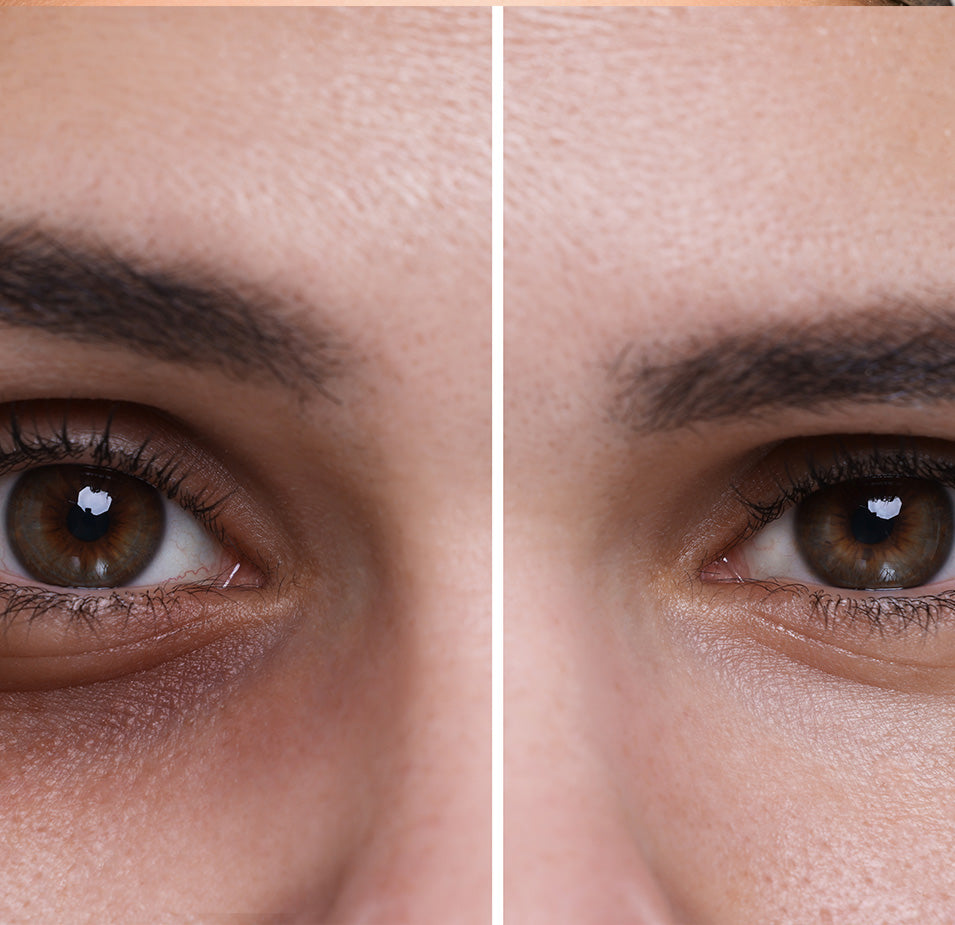
You know sesame oil for its rich, nutty flavor that makes stir frys and salads delectable—but did you know that your skin loves sesame oil as much as your tastebuds? This lightweight oil is renowned for its ability to reverse damage induced by free radicals, reduce inflammation, and ease swelling. Skincare enthusiasts have turned to sesame oil for thousands of years in pursuit of healthy and radiant skin.
|
The Basics With antioxidant, antimicrobial, and anti-inflammatory properties, sesame oil should be part of your staple skincare ingredients list for treating a variety of ailments. The benefits of sesame oil include:
|
What is sesame oil?
The use of sesame oil for its healing properties dates back to ancient cultures, from the Egyptians to the Greeks. The oil is derived from the seeds of Sesamum Indicum, a flowering sesame plant native to East Africa and India. It is now used widely all over the world and renowned among skincare experts.
What makes sesame oil so special?
Sesame seeds may be tiny, but when pressed into an oil, the skincare benefits they provide are huge. With abundant nutrients, fatty acids, and minerals, sesame oil boasts powerful antioxidant and anti-inflammatory properties which actively protect the skin from free radical damage and strengthen the skin barrier.
While sesame oil can produce amazing benefits, looking after your skin isn’t just about using the right ingredients. There are a number of lifestyle factors that can have a direct impact on skin health, such as air pollution, high blood sugar levels, excessive sun exposure, and lack of sleep—so remember to approach your skincare routine with a holistic, big-picture perspective to experience the best results from sesame oil.
Antioxidants, fatty acids, and vitamin E are the three pillars of sesame oil’s beneficial properties. Each one of these components has its own miracle powers for healthy, youthful, strengthened skin.
Antioxidants
- Protect against environmental stressors
- Prevent premature signs of aging
- Fortify cell membranes
- Neutralize toxins
Antioxidants have dominated the skin care space in recent years, and rightfully so. What makes antioxidants such a sought-after ingredient is their ability to reduce the damage caused by harmful molecules called free radicals.
Anyone who has built a skincare routine knows how gratifying it feels when you start to see results. Free radicals are powerful enough to undo all your hard work by breaking down the skin’s collagen. This results in wrinkles, fine lines, dark spots, and saggy skin (a condition called oxidative stress).
Free radicals aren’t all bad—our bodies need them to maintain a harmonious balance with antioxidants. But although free radicals are naturally produced by our bodies, they can cause significant damage to the skin when they outnumber antioxidants.
To maintain optimum skin health, using sesame oil as a rich source of antioxidants may prove to be extremely beneficial. Antioxidants act as a shield, giving your skin all the goodness it needs while protecting it against environmental damage.
Vitamin E
- Anti-inflammatory
- Hydrating
- Moisturizing
- Healing
Vitamin E is a fat-soluble compound that plays many essential roles in the body. It works alongside fellow antioxidant vitamin C and skin-firming selenium to protect the body from oxidative stress, which can have a significant impact on the overall appearance of the skin.
Oxidative stress speeds up the aging process, causing wrinkles, sagging, and texture changes on the skin. Vitamin E coutneracts this process, helping the skin retain firmness and moisture to look and feel young from the inside-out.
Plant oils like sesame oil are the best source of Vitamin E as they are more easily absorbed into the body. To get the maximum positive impact and bioavailability of nutrients from natural Vitamin E, look for terms such as “100% natural” or “cold-pressed” sesame oil products.
Fatty acids
- Build healthy cell membranes
- Produce the skin’s natural oil barrier
- Keep skin hydrated
- Reveal a more youthful complexion
Sesame oil contains several essential fatty acids, which have moisturizing properties that work to keep skin supple, soft, and hydrated. The most beneficial essential fatty acids for the skin are linoleic acid (Omega-6), alpha-linolenic acid (Omega-3), and oleic acid (Omega-9).
Essential fatty acids offer incredible benefits for the skin, acting as building blocks in the skin’s cells and strengthening its surface layers to reveal a healthier and younger-looking complexion.
What does sesame oil do for skin?

Known as the “queen of oils,” sesame oil has been used as a healing beauty ingredient throughout the great civilizations of history. In modern times, it is commonly used in moisturizers, serums, and creams, as well as in its pure and unadulterated form.
While sesame oil is a simple ingredient from a humble plant, it contains a vast array of skincare superhero components. In addition to vitamin E and antioxidants, sesame oil is rich in a variety of nutrients like vitamin A, B1, B2, and B3. It also contains a number of fatty acids and minerals, including zinc, magnesium, and calcium. Sesame oil is gentle and perfect for all skin types.
Anti-aging
Although attitudes towards aging are improving, unrealistic beauty standards are still evident in the imagery we see online and in magazines. While it’s important to embrace the beauty of growing older, caring for your skin can help prevent premature signs of aging and keep your skin healthier for longer.
Sesame oil is a foundational ingredient in a comprehensive anti-aging routine. A study found that continuous application of sesame oil can reduce oxidative stress, which helps prevent tissue damage and premature aging. Sesame oil also supports the cell renewal process, replacing dead skin cells and revealing your best complexion.
Moisturizing
Hydration is your skin’s best friend. Moisturizing reduces the likelihood of skin issues such as fine lines, wrinkles, and blemishes. Those with oily or sensitive skin might be tempted to skip moisturizers, but doing this can lead to unintended consequences. Our skin needs moisture in order to look its best, regardless of its type or current condition.
In addition to applying a daily moisturizer, don’t be afraid to go the extra mile by incorporating moisture-boosting, plant-based oils into your routine. Sesame oil is hailed as one of the best natural moisturizers for skin because of its detoxing benefits and its ability to trap moisture while forming a protective layer on the skin, leaving you feeling softer and looking brighter. The fatty acids in sesame oil help keep skin soft, supple, and moisturized.
Exfoliation
Dead skin cells need to be removed regularly in order for new cells to appear. If dead skin cells aren’t removed from the skin, they can accumulate in the skin’s hair follicles and combine with the body’s natural oils (sebum) to clog the pores. Clogged pores can then cause a variety of skin issues such as blackheads and whiteheads. If bacteria enters the follicle, pimples can become inflamed, so removing dead skin cells on a regular basis is critical for good skin health.
In tandem with a high-quality cleanser, sesame oil can act as an exfoliant by removing dead skin cells and dry skin. Mixing a small amount into your exfoliating cleanser or scrub can make a difference to the skin’s overall appearance.
FAQ
Is sesame oil suitable for all skin types?
The anti-inflammatory, antibacterial and antifungal properties of sesame oil make it suitable for most skin types. It does not need to be diluted before use. In order to reap the benefits that this ingredient has to offer, it’s best to opt for pure sesame oil. As with all skincare ingredients, it’s also important to observe the way it interacts with your specific skin type to maximize efficacy and minimize unwanted effects.
Something else to be aware of is that sesame oil comes in two forms: light (which is obtained from raw sesame seeds) and dark (which is obtained from toasted seeds). Both can be topically applied to the skin. Before using sesame oil, check the label to be sure that it is cold-pressed. Cold-pressed oils have a higher nutritional value.
Is sesame oil non-comedogenic?
Sesame oil is non-comedogenic. Non-comedogenic oils are superior because they do not clog pores. As a result, skin is able to breathe and remain free from much-dreaded breakouts. Comedogenic oils have the opposite effect on the skin. They can clog pores and cause blackheads and whiteheads.
For those with oily and sensitive skin, it is best to do a patch test before using sesame oil. Apply a small amount on your inner wrist and wait 24 hours to see if you have a reaction before you use it liberally. Also, if your skin tends to be on the reactive side, be sure to check storage instructions as some oils may need to be kept in the fridge while others can be stored at room temperature.
Is sesame oil vegan?
Sesame oil comes from sesame seeds. These seeds grow in pods and are derived from the sesame plant, completely free of animal products. If you are using a product that contains sesame oil in combination with other ingredients, be sure to check the label before use.
Does sesame oil have any side effects?
Sesame oil is generally safe and well-tolerated by most skin types. If you are allergic to sesame seeds, you will experience the same reaction to sesame oil. If you experience eczema and itching soon after applying sesame oil to your skin, stop using it immediately. It’s always a good idea to check with a healthcare provider before introducing a new ingredient into your skincare routine.
References
- Rizvi S, Raza ST, Ahmed F, Ahmad A, Abbas S, Mahdi F. The role of vitamin e in human health and some diseases. Sultan Qaboos Univ Med J. 2014;14(2):e157-e165.
- Chiang JPJ, Hsu DZ, Tsai JC, Sheu HM, Liu MY. Effects of topical sesame oil on oxidative stress in rats. Altern Ther Health Med. 2005;11(6):40-45.
- Lin TK, Zhong L, Santiago JL. Anti-inflammatory and skin barrier repair effects of topical application of some plant oils. Int J Mol Sci. 2017;19(1):70.
- Thiel, R. J. Natural vitamins may be superior to synthetic ones. Medical hypotheses 55.6 (2000): 461-469.
- Alkadi H. A review on free radicals and antioxidants. Infect Disord Drug Targets. 2020;20(1):16-26.
- Huang TH, Wang PW, Yang SC, Chou WL, Fang JY. Cosmetic and therapeutic applications of fish oil’s fatty acids on the skin. Mar Drugs. 2018;16(8):256.
- Hsu DZ, Liu MY. Effects of sesame oil on oxidative stress after the onset of sepsis in rats. Shock. 2004;22(6):582-585.

















